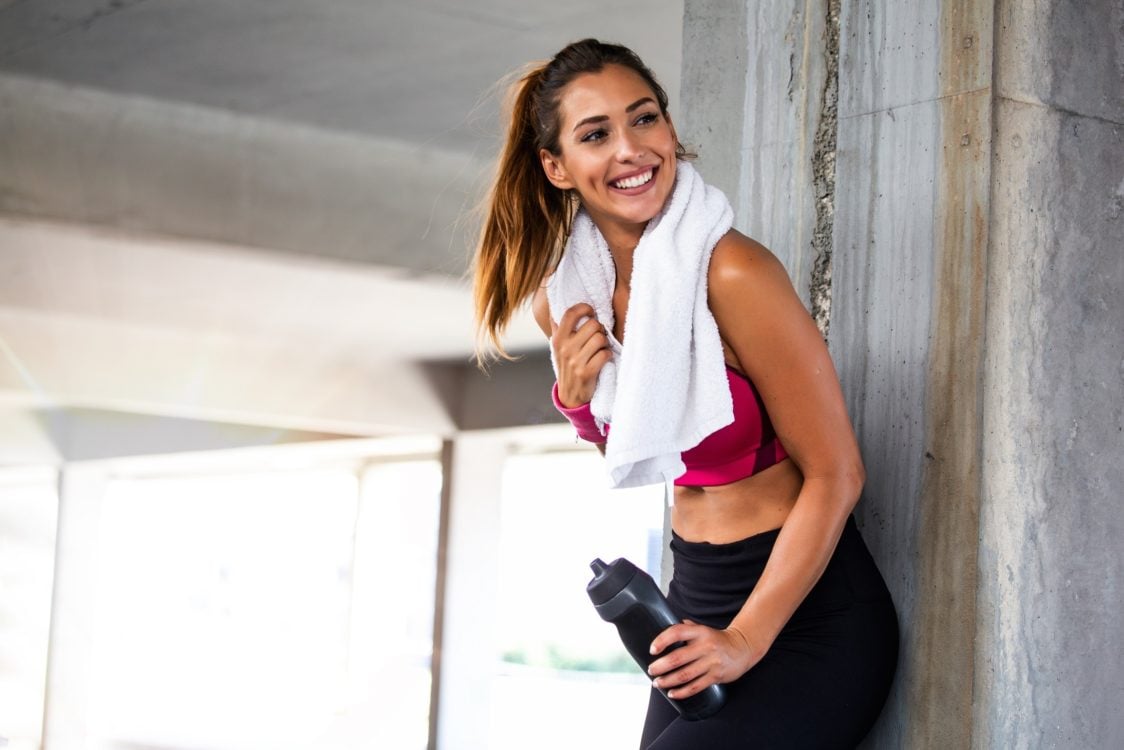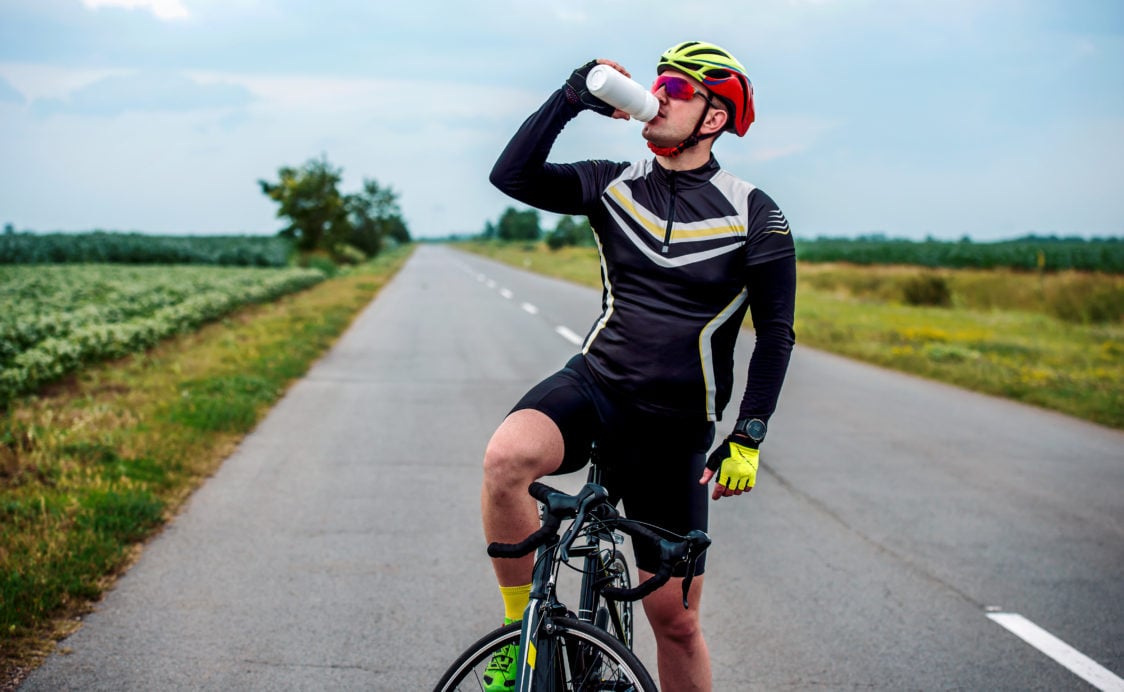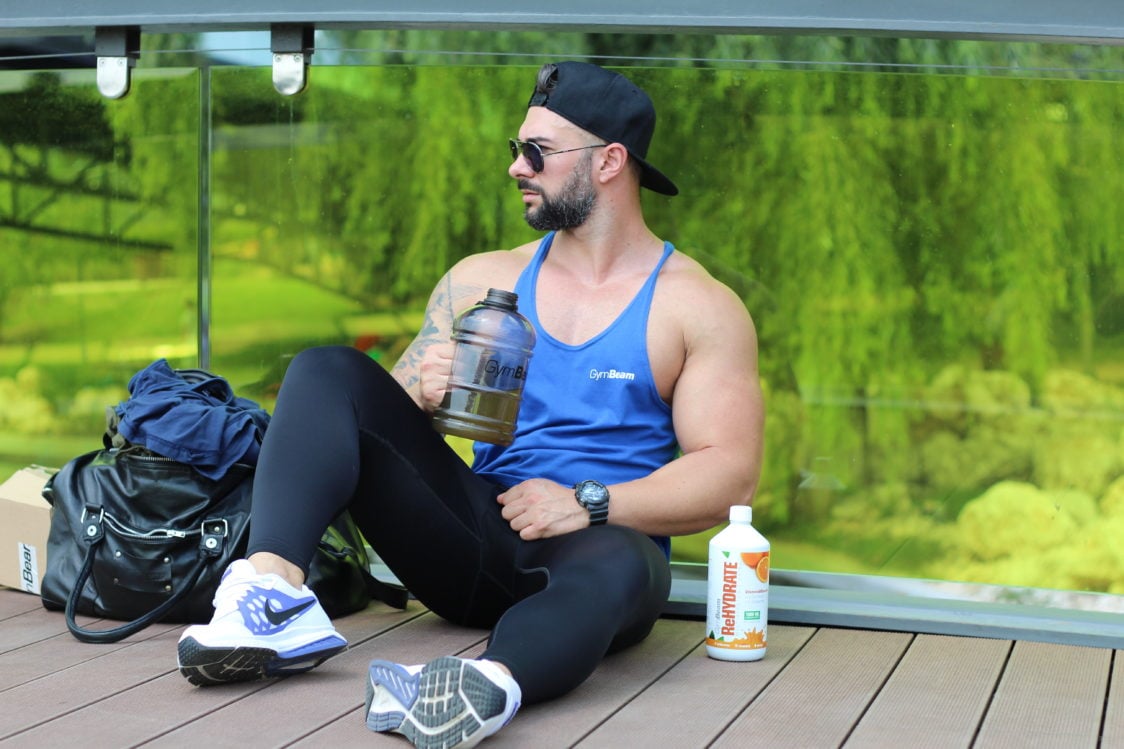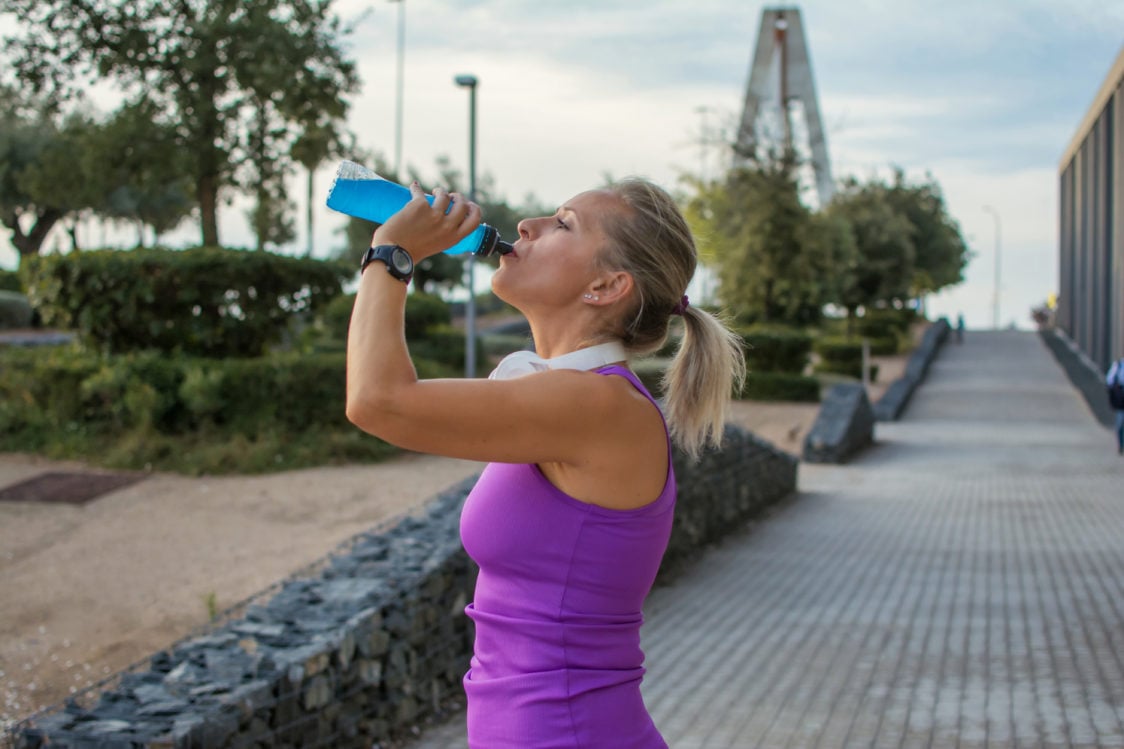Table of Contents
If you’re an avid runner, cyclist or other endurance athlete, you’ve probably heard about the importance of ion supply drinks. They are generally known to help replenish fluids, electrolytes and energy during prolonged physical activity. But do they also make sense at the gym, at football practice and in other sports?
Why is it important to drink during exercise?
Running, cycling and other physical activities usually cause us to sweat more, resulting in loss of body fluids. If this drop reaches 2% of body weight (in a 70 kg person this corresponds to 1.4 litres), dehydration can occur. Its symptoms include fatigue, headache, dizziness and impaired performance. [1]
It is common for performance athletes to lose 4 -10 litres of water in one day. For this reason, it is essential that they replenish fluids throughout the day and during exercise. [2]
Recommended fluid intake during exercise
Fluid intake always depends on environmental conditions such as ambient temperature or humidity, duration and intensity of exercise or the weight of the athlete. When you move, the working muscles also generate heat that needs to be removed. Your body then does whatever is necessary to cool itself efficiently. This is where sweating works best.
As a standard, it is recommended to drink:
- 500 ml of fluid 2 hours before exercise
- 125 – 250 ml immediately before exercise
- 125 – 250 ml every 10 – 20 minutes during training or a race
- after exercise, it is recommended to drink 150% of your fluid loss (e.g. if you weigh 1 kg less after training, you should gradually replenish 1.5L of fluid) [3-4]
These recommendations are especially true for endurance sports, where the greatest fluid losses typically occur. Minerals, or electrolytes, also leave the body with sweat and need to be replenished. In such a situation, it is then advisable to replace plain water with ion supply drinks containing electrolytes.
If you are wondering why drinking enough water is so important and what dehydration can cause, read our article How Insufficient Water Intake Affects Your Health.

Why do you need to replenish electrolytes?
The minerals that are classified as electrolytes include sodium, potassium, calcium, magnesium and chloride. For example, an athlete can lose 3,500 – 7,000 mg of sodium per day. All of these micronutrients have a number of important roles in the body related to hydration, muscle function, nerve transmission and nutrient metabolism. Thus, they can have a major impact on athletic performance. [2, 5]
In terms of adequate hydration, it is essential to maintain optimal levels of sodium and potassium in the body. These minerals regulate the excretion and retention of water in the body. Low sodium levels can even lead to dangerous hyponatraemia. This condition is typically manifested by disorientation, nausea and disturbances of consciousness. It is particularly common in demanding endurance events such as marathons or ultra-marathons and is also a risk with a sudden high intake of low-sodium water. In addition, sodium, magnesium and calcium deficiencies are associated with a higher risk of muscle cramps. [6, 7]
For strenuous and prolonged training, electrolyte intake from diet and supplements before and after training may not be sufficient. They should be replenished during the activity as well as carbohydrates, which can prevent a drop in performance. The easiest way to do this is by drinking ion supply drinks. [3]
What is an ion supply drink?
Ion supply drinks are designed for athletes to help them effectively replenish fluids, minerals and energy. They usually contain electrolytes, easily digestible carbohydrates and sometimes vitamins, amino acids, caffeine and other functional substances. As a result, they can help maintain performance and delay fatigue, especially during endurance activities. [6]
The positive effect of ion supply drinks on athletic performance has been demonstrated in a number of studies. Their conclusions often show that compared to plain water, drinking fluids containing electrolytes and carbohydrates led to improved performance. This effect occurred in high-intensity sporting activities that lasted at least an hour. For shorter and less strenuous activities, such results are usually not obtained and therefore it is usually sufficient to stick to plain water. [8]
Sport drinks containing ions can help:
- handle longer trainings and run or cycle a longer distance,
- better tolerate high intensity loads and improve your times over different distances and get the best out of yourself during a race.
You might be interested in these products:
What are the active ingredients in an ion supply drink?
1. Electrolytes
Most ion supply drinks contain sodium. It is then followed by potassium, magnesium, calcium and other electrolytes that have an important function during sports. They can also be found in the form of handy tablets, which can be taken with water.
What are the functions of electrolytes during exercise?
- Sodium and potassium are responsible for water management in the body. They are thus crucial for the proper absorption and excretion of water.
- Magnesium, calcium and potassium contribute to proper muscle function.
- Magnesium helps reduce feelings of fatigue and exhaustion.
- Chloride supports the maintenance of acid-base balance in the body.
- Calcium contributes to the normal function of nerve transmissions, which allow our muscles to receive signals from the brain for movement. [6]
Drinks containing electrolytes help maintain the level of these minerals at an optimal level, which helps to protect against dehydration, hyponatraemia, indigestion, muscle cramps, fatigue and weakness.
What is the recommended electrolyte intake for endurance sports?
In endurance sports, sodium supplementation is most important to prevent hyponatraemia. Therefore, these official recommendations refer to this electrolyte in particular.
- For exercise lasting more than two hours, we should replenish 300 – 600 mg of sodium per hour.
- According to the American College of Sports Medicine, it is advisable to choose a drink with 0.5 – 0.7 g of sodium per 1 litre of fluid for sports activities up to 3 hours. This should then be drunk in quantities of 125 – 250 ml every 10 – 20 minutes.
- For sessions exceeding 3 hours, it is typically better to switch to more concentrated drinks with 0.7 – 1 g sodium per 1 litre of fluid due to greater sweat loss. Also drink 125 – 250 ml every 10 – 20 minutes. [3, 6]

2. Carbohydrates
The carbohydrate content varies from one ion supply drink to another and most often ranges from 3 to 8 g per 100 ml. They are commonly in the form of rapidly absorbed carbohydrates such as glucose, fructose, sucrose, isomaltulose or maltodextrin. [9]
These carbohydrates serve as a readily available source of energy during exercise. They are quickly broken down and absorbed by the body, allowing our muscles to use them almost immediately for energy to fuel movement. They help prevent the depletion of the stored carbohydrate glycogen, thus delaying muscle fatigue.
Compared to carbohydrate gels and bars, ion supply drinks contain less carbohydrates, but there is a reason for that. This is because the low concentration is crucial for efficient absorption of fluids and electrolytes from the digestive system. With higher amounts of carbohydrates, this process could be slowed down and there is also a risk of digestive problems. [9]
What is the recommended carbohydrate intake for endurance sports?
- The American College of Sports Medicine recommends drinking beverages with 6 – 8% carbohydrate content (isotonic drink) for sports performance over 60 minutes.
- To maintain optimal glycogen levels during endurance activity, a total of 30 – 60 g of rapidly digestible carbohydrates per hour should be consumed from beverages and other supplements.
- In case of activities (races) lasting more than 2.5 hours, this intake can be increased up to 90 g. A combination of glucose and fructose in a 2:1 ratio (60 g glucose + 30 g fructose) is ideal, as it is efficiently absorbed through the digestive system.
- You should always adapt your carbohydrate intake to your own dietary habits and digestive tolerance. [3, 9]
In the case ofpowdered ion supply drinks or liquid concentrate form, the carbohydrate concentration depends on the amount of product and water used. Depending on the dilution, you can get lower or higher carbohydrate levels. [5]
3. Other active ingredients
Some ion supply drinks differ in their caffeine, vitamin, amino acid content in the form of BCAA or fat burner (typically l-carnitine). Thanks to these substances, they provide extra benefits. Caffeine, for example, can give you an energy boost and delay fatigue, while fat burners are useful for weight loss, when every extra calorie burned counts. BCAA can help delay fatigue and protect muscle mass from being burned for energy, which is useful in both endurance and strength sports.
If you’re into endurance sports and wondering what other supplements could help you improve your performance, check out our article on the 11 Best Supplements for Running, Cycling and Other Endurance Sports.

Types of ion supply drinks and their use in sport
In sports nutrition you can encounter three types of ion supply drinks, which differ mainly in their carbohydrate content. Depending on whether they have a lower, similar or higher concentration of dissolved substances (osmolality) compared to blood plasma, they are divided into hypotonic, isotonic and hypertonic. These properties then influence the rate of fluid absorption and its use during sport. [10-12]
Types of ion supply drinks | Osmolality compared to blood plasma | Carbohydrate content | Features | Most common uses |
|---|---|---|---|---|
| hypotonic drinks | lower | less than 6% | fastest fluid absorption, lower carbohydrate content | endurance or strength performance up to 60 minutes |
| isotonic drinks | similar to | 6 – 8 % | fast replenishment of fluids and carbohydrates during exercise | endurance activities, team sports or high-intensity strength training lasting longer than 60 minutes |
| hypertonic drinks | higher | more than 8% | slower fluid absorption, higher carbohydrate content | before and after exercise to replenish carbohydrates (stored glycogen) |
Use of ion supply drinks
For most sports activities that last no more than an hour, fluid intake in the form of plain water is sufficient. However, the situation changes with high-intensity or prolonged sports, where, especially in challenging environmental conditions, there is a higher loss of water and electrolytes, and the need for energy replenishment increases.
1. When is a hypotonic drink appropriate?
The hypotonic drink has the lowest carbohydrate content of the three (less than 6%), making it suitable for activities where you don’t need to replenish energy as much but want to take in electrolytes.
- For sports activities up to 60 minutes at higher temperatures and increased humidity, when one usually sweats more.
- Bikram yoga or any other kind of exercise in a hot environment.
- During warm summer days to maintain optimal hydration. [13]
2. When is an isotonic drink suitable?
An isotonic drink boasts an ideal ratio between water and carbohydrate content (6 – 8%). Thanks to this, it is quickly absorbed by the body, does not burden the digestive tract as much and gives some energy at the same time.
- Endurance sports such as running, cycling, swimming and hiking over 60 minutes.
- Team sports like football, hockey, rugby, volleyball, basketball over 60 minutes.
- High intensity strength training or CrossFit lasting longer than 60 minutes.
- Zumba, aerobics and other high-intensity dance classes that you do for longer than an hour.
- During short and high-intensity bouts of exercise. In this case, however, simply rinsing the mouth with a carbohydrate-containing drink (mouth rinsing) has proven effective. This does not put any strain on the stomach, and we can still feel a surge of energy due to the activation of certain centres in the brain. [13]
3. When is a hypertonic drink suitable?
The hypertonic drink has the highest carbohydrate content (more than 8%). For this reason, it is slower to digest and puts more strain on the digestive tract. Therefore, it is not suitable when your primary goal is to replenish fluids quickly. However, if you need a source of energy that is absorbed more quickly than from solid food, a hypertonic solution may be ideal.
- Before and after exercise to replenish glycogen stores.
- As a quick source of energy, for example, when blood sugar drops, after a long fast.
- Endurance activities in cold weather for more than 60 minutes, when you don’t need to increase your fluid intake so much, but you are mainly interested in replenishing your energy. In this case, the recommended fluid intake is usually reduced. Alternatively, you can alternate a hypertonic drink with an isotonic or hypotonic drink, which are more suitable for fluid replenishment.
- For short and high-intensity bouts of exercise, thus mouth rinsing is sufficient. [13]

When, on the other hand, is it not necessary to drink ion supply drinks?
In the case of some sporting activities, ion supply drinks are pointless and it is better to just stick to plain water. If your goal is weight loss, they can even delay your results. One litre of isotonic drink contains approximately 250 calories, which is more than the average 65 kg woman burns in an hour of pilates or yoga. So, instead of going into a calorie deficit, which is crucial for weight loss, you can go into a calorie surplus. [14]
1. Regular workout at the gym
In classic strength training, which is typically characterised by pauses between sets, you usually don’t get to such a high intensity where you need to replenish energy or electrolytes.
2. Cardio training and fitness classes up to 60 minutes
When running, cycling or other forms of exercise in normal conditions (without extreme temperatures), clean water is also sufficient.
3. Pilates, yoga and other lower intensity exercises
If you attend yoga, pilates or gymnastics classes (at a non-professional level), you usually do not need to replenish electrolytes and energy during exercise.
How to make a homemade ion supply drink?
Ion supply drinks contain a balanced ratio of water, minerals and easily digestible carbohydrates. They are designed for athletes with their needs in mind. The ones you buy are a safe bet because they already contain the ideal mix of substances in an optimal ratio. They can be drunk straight from the bottle or diluted with water according to the recommended use. But then there is also the option of making a homemade sports drink. This probably won’t be as tasty, but it will serve its purpose. How to do it?
To make 1 litre of isotonic drink you will need:
- 1000 ml clean warm water
- 60–80 g maltodextrin, glucose or fructose
- ¼ teaspoon salt
- you can also add magnesium powder to the mix
- sweetener for flavouring if desired
Mix everything thoroughly, ideally in a shaker, and use as a sports drink according to the above recommendation. [15]
What should you remember?
After reading today’s article, you now know when ion supply drinks make sense and in which cases it is enough to drink plain water. For example, if you are going for a long run or a day-long bike trip, it is better to pour an isotonic drink into a sports bottle.
However, if you have an hour-long workout in the gym or a yoga class, there is no need to worry about replenishing electrolytes and carbohydrates. In any case, it is important to keep an eye on your daily fluid intake and adapt your fluid intake to the current conditions (weather, physical activity).
Did today’s article help you to get a better understanding of ion supply drinks? If so, share it with your friends.
[1] Kerksick, C. M., Wilborn, C. D., Roberts, M. D., Smith-Ryan, A., Kleiner, S. M., Jäger, R., Collins, R., Cooke, M., Davis, J. N., Galvan, E., Greenwood, M., Lowery, L. M., Wildman, R., Antonio, J., & Kreider, R. B. (2018). ISSN exercise & sports nutrition review update: Research & recommendations. – https://doi.org/10.1186/s12970-018-0242-y
[2] Shirreffs, S. M., & Sawka, M. N. Fluid and electrolyte needs for training, competition, and recovery. – https://doi.org/10.1080/02640414.2011.614269
[3] Nutrition and Supplement Update for the Endurance Athlete: Review and Recommendations. – https://www.ncbi.nlm.nih.gov/pmc/articles/PMC6628334/
[4] Doane. Hydratation guidelines.– https://www.nata.org/sites/default/files/hydration-guidelines_handout.pdf
[5] Sports Dietitians Australia (SDA). Sports Drinks. – https://www.sportsdietitians.com.au/factsheets/fuelling-recovery/sports-drinks/
[6] Orrù, S., Imperlini, E., Nigro, E., Alfieri, A., Cevenini, A., Polito, R., Daniele, A., Buono, P., & Mancini, A. Role of Functional Beverages on Sport Performance and Recovery. – https://doi.org/10.3390/nu10101470
[7] Cyclingnews.Com. Exercise and effective salt replacement. – https://www.cyclingnews.com/features/exercise-and-effective-salt-replacement/
[8] Effects of Hypotonic and Isotonic Sports Drinks on Endurance Performance and Physiology. – http://www.sportsci.org/2010/dlbwgh.htm
[9] Medicine & Science in Sports & Exercise. Nutrition and Athletic Performance. – https://doi.org/10.1249/MSS.0b013e31890eb86
[10] Diabetes. Sports Drinks. – https://www.diabetes.co.uk/sports-drinks.html
[11] TrainingPeaks. Which type of sports drink is right for you. – https://www.trainingpeaks.com/blog/which-type-of-sports-drink-is-right-for-you/
[12] Personal Trainer Certification, Nutrition Courses, Fitness Education. Sports Drink Concentrations. – https://www.nestacertified.com/types-of-sports-drinks-and-when-to-use-them/
[13] Sports Nutrition. Which sports drink is best for you? – https://6dsportsnutrition.com/en/science/welke-sportdrank-past-het-best-bij-jou
[14] Compendium of physical activities. – https://sites.google.com/site/compendiumofphysicalactivities/Activity-Categories/winter-activtities
[15] Health Nutritionist. Try making your own sports drinks. – https://www.healthnutritionist.co.uk/post/ditch-lucozade-try-making-your-own-sports-drinks


Add a comment